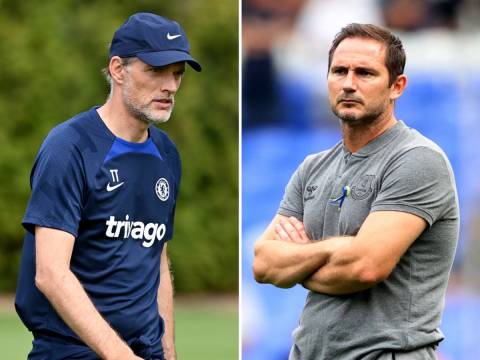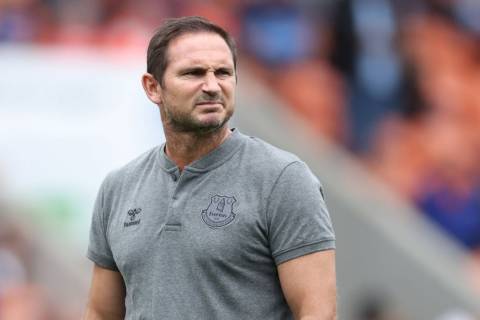Thomas Tuchel and Frank Lampard still seeking to imprint ideals fully on Chelsea and Everton for new season
Even as he praised his predecessor, Thomas Tuchel managed to give a preview of what his team would be like. “He was one of the key figures to demonstrate in 90 minutes what Chelsea was about: intensity, devotion, winning mentality,” he said. He was discussing Frank Lampard the midfielder rather than the manager during the charm offensive at his unveiling. Tuchel flattered Lampard and then outshone him. If the Englishman’s team were too porous, the German devised a formation on the plane over from Paris and organised his new charges with such devastating efficiency that they only conceded two goals in his first 14 games at the helm. Lampard left Chelsea in ninth and Tuchel made them Champions League winners in little more than four months. Arguably Chelsea’s greatest player laid some of the groundwork but Tuchel had the clarity of thought and the coaching and tactical nous to transform them into European champions. Mason Mount was Lampard’s protégé, Reece James was given a debut by him and his signings included Edouard Mendy, Thiago Silva and Ben Chilwell – if Kai Havertz and Timo Werner joined during his tenure, it was harder to argue he had much input in their recruitment – but Tuchel turned them into a team. It was hard to rebut the idea Tuchel was an immediate upgrade on Lampard. Yet as they reconvene on Saturday, it is with the Everton manager having won their only meeting, 1-0 in May, and with each facing a similar challenge: can he shape his own side, rather than adopting a pragmatic policy to get the best from the group he inherited? Because each of the 14 players Tuchel used at Goodison Park three months ago played for Lampard; of the 14 the Englishman deployed, only the last-minute replacement Dele Alli joined in his reign. Sides were packed with their predecessors’ players: that Romelu Lukaku was an unused substitute reflects the reality that Tuchel’s £98m buy represents the greatest failure of his management at Stamford Bridge. Now change has come to both clubs, albeit not in as drastically as either manager would want. Tuchel would prefer to have at least one more defender and an extra wing-back, Lampard another striker and further options in the midfield. But recruitment has taken on comparable respects. They have added an experienced centre-back apiece, in Kalidou Koulibaly and James Tarkowski, and a winger, in Raheem Sterling and Dwight McNeil. Each forward line has a significant absentee, in the loaned Lukaku and sold Richarlison, Everton’s match-winner in May. Everton offloaded the Brazilian to balance the books; Chelsea lost Antonio Rudiger for a rather different type of financial reason. This isn’t quite the sanctioned derby – while Roman Abramovich has lost his hold on Chelsea, Alisher Usmanov was officially only a sponsor at Everton, albeit one with very close connections to owner Farhad Moshiri – but they are clubs adjusting to new realities. Lampard has espoused various vaguely progressive ideas – pressing, passing, youth – but they rarely translated to a relegation struggle that was won in part by a backs-to-the-wall effort and in part by an exercise in collective willpower, with their fans helping to intimidate Chelsea to defeat on their last trip to Merseyside. Yet if he has his team – and without more additions and while Everton are still undermined by past confused thinking, it probably is not yet – it comes with the responsibility to build something more lasting that displays footballing principles. Tuchel appeared Lampard’s antithesis upon his appointment and, at times, has had the opposite problems in management in England. Lampard’s teams sometimes concede too many, Tuchel’s score too few. Lukaku top-scored in all competitions with 15 goals last season; Lampard topped that eight times himself from midfield in his Blues career. If it places a focus on Sterling to be prolific, there are broader questions about Tuchel’s blueprint: Chelsea ranked 119 and 137 shots behind the top two last season, with 40 and 38 respectively fewer on target and an expected goals tally of 22.0 and 21.8 lower. This was not simply a case of poor finishing but a wider issue of creativity, coupled with individual underachievement – only Mount of their attack-minded players has truly improved under Tuchel – compounded by injuries to influential wing-backs. There have been hints that Tuchel would like to switch to a back four if personnel permit. His initial adoption of 3-4-2-1 was a revelation but there were times it seemed a straitjacket, condemning Chelsea to be more defensive than their peers. They had control but insufficient dynamism at times. Tuchel reinvented Lampard’s Chelsea as masters of footballing chess. Yet the paradox of Tuchel’s greatest side was that they weren’t his players at all. Perhaps, after 18 months, a Champions League and a change of ownership, his team will start to emerge at Goodison Park on Saturday. Maybe, freed from the immediacy of a salvage job, Lampard will offer signs of a long-term direction for Everton. But as Chelsea’s present and past collide, it is perhaps with each needing to borrow a little from the other, with Tuchel requiring the sense of adventure Lampard first brought to Stamford Bridge as a manager and the goals he invariably provided as a player and Lampard looking for the combination of defensive security, possession, strategic thinking and a winning habit his successor offered. Read More Koulibaly reveals he spoke to Tuchel and Zola before asking for John Terry's shirt number Chelsea ‘consider’ record-bid for defender Wesley Fofana Cesar Azpilicueta signs new two-year Chelsea contract to end Barcelona speculation Chelsea enter race for Brighton wing-back Marc Cucurella On this day in 2014: Romelu Lukaku joined Everton for club-record fee Barcelona agree to sign Chelsea target Jules Kounde from Sevilla for £41.87m
Even as he praised his predecessor, Thomas Tuchel managed to give a preview of what his team would be like. “He was one of the key figures to demonstrate in 90 minutes what Chelsea was about: intensity, devotion, winning mentality,” he said. He was discussing Frank Lampard the midfielder rather than the manager during the charm offensive at his unveiling.

Tuchel flattered Lampard and then outshone him. If the Englishman’s team were too porous, the German devised a formation on the plane over from Paris and organised his new charges with such devastating efficiency that they only conceded two goals in his first 14 games at the helm. Lampard left Chelsea in ninth and Tuchel made them Champions League winners in little more than four months.

Arguably Chelsea’s greatest player laid some of the groundwork but Tuchel had the clarity of thought and the coaching and tactical nous to transform them into European champions. Mason Mount was Lampard’s protégé, Reece James was given a debut by him and his signings included Edouard Mendy, Thiago Silva and Ben Chilwell – if Kai Havertz and Timo Werner joined during his tenure, it was harder to argue he had much input in their recruitment – but Tuchel turned them into a team.
It was hard to rebut the idea Tuchel was an immediate upgrade on Lampard. Yet as they reconvene on Saturday, it is with the Everton manager having won their only meeting, 1-0 in May, and with each facing a similar challenge: can he shape his own side, rather than adopting a pragmatic policy to get the best from the group he inherited? Because each of the 14 players Tuchel used at Goodison Park three months ago played for Lampard; of the 14 the Englishman deployed, only the last-minute replacement Dele Alli joined in his reign.
Sides were packed with their predecessors’ players: that Romelu Lukaku was an unused substitute reflects the reality that Tuchel’s £98m buy represents the greatest failure of his management at Stamford Bridge. Now change has come to both clubs, albeit not in as drastically as either manager would want. Tuchel would prefer to have at least one more defender and an extra wing-back, Lampard another striker and further options in the midfield.
But recruitment has taken on comparable respects. They have added an experienced centre-back apiece, in Kalidou Koulibaly and James Tarkowski, and a winger, in Raheem Sterling and Dwight McNeil. Each forward line has a significant absentee, in the loaned Lukaku and sold Richarlison, Everton’s match-winner in May.
Everton offloaded the Brazilian to balance the books; Chelsea lost Antonio Rudiger for a rather different type of financial reason. This isn’t quite the sanctioned derby – while Roman Abramovich has lost his hold on Chelsea, Alisher Usmanov was officially only a sponsor at Everton, albeit one with very close connections to owner Farhad Moshiri – but they are clubs adjusting to new realities.
Lampard has espoused various vaguely progressive ideas – pressing, passing, youth – but they rarely translated to a relegation struggle that was won in part by a backs-to-the-wall effort and in part by an exercise in collective willpower, with their fans helping to intimidate Chelsea to defeat on their last trip to Merseyside. Yet if he has his team – and without more additions and while Everton are still undermined by past confused thinking, it probably is not yet – it comes with the responsibility to build something more lasting that displays footballing principles.
Tuchel appeared Lampard’s antithesis upon his appointment and, at times, has had the opposite problems in management in England. Lampard’s teams sometimes concede too many, Tuchel’s score too few. Lukaku top-scored in all competitions with 15 goals last season; Lampard topped that eight times himself from midfield in his Blues career.
If it places a focus on Sterling to be prolific, there are broader questions about Tuchel’s blueprint: Chelsea ranked 119 and 137 shots behind the top two last season, with 40 and 38 respectively fewer on target and an expected goals tally of 22.0 and 21.8 lower. This was not simply a case of poor finishing but a wider issue of creativity, coupled with individual underachievement – only Mount of their attack-minded players has truly improved under Tuchel – compounded by injuries to influential wing-backs.
There have been hints that Tuchel would like to switch to a back four if personnel permit. His initial adoption of 3-4-2-1 was a revelation but there were times it seemed a straitjacket, condemning Chelsea to be more defensive than their peers. They had control but insufficient dynamism at times.
Tuchel reinvented Lampard’s Chelsea as masters of footballing chess.
Yet the paradox of Tuchel’s greatest side was that they weren’t his players at all. Perhaps, after 18 months, a Champions League and a change of ownership, his team will start to emerge at Goodison Park on Saturday. Maybe, freed from the immediacy of a salvage job, Lampard will offer signs of a long-term direction for Everton.
But as Chelsea’s present and past collide, it is perhaps with each needing to borrow a little from the other, with Tuchel requiring the sense of adventure Lampard first brought to Stamford Bridge as a manager and the goals he invariably provided as a player and Lampard looking for the combination of defensive security, possession, strategic thinking and a winning habit his successor offered.
Read More Koulibaly reveals he spoke to Tuchel and Zola before asking for John Terry's shirt number
Chelsea ‘consider’ record-bid for defender Wesley Fofana
Cesar Azpilicueta signs new two-year Chelsea contract to end Barcelona speculation
Chelsea enter race for Brighton wing-back Marc Cucurella
On this day in 2014: Romelu Lukaku joined Everton for club-record fee
Barcelona agree to sign Chelsea target Jules Kounde from Sevilla for £41.87m


